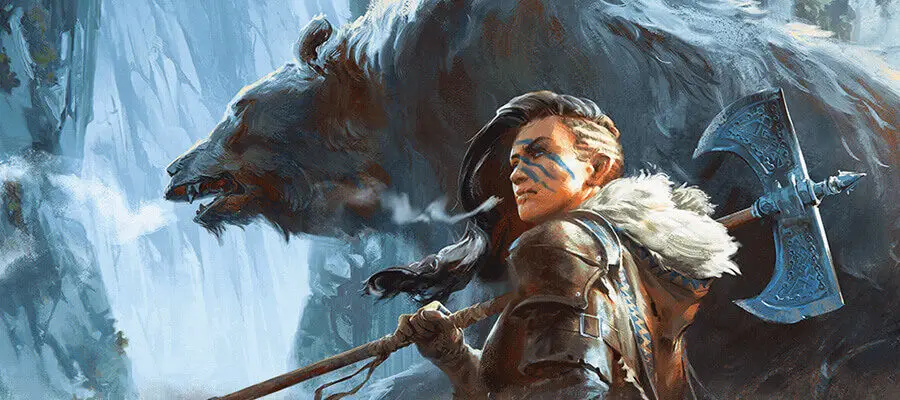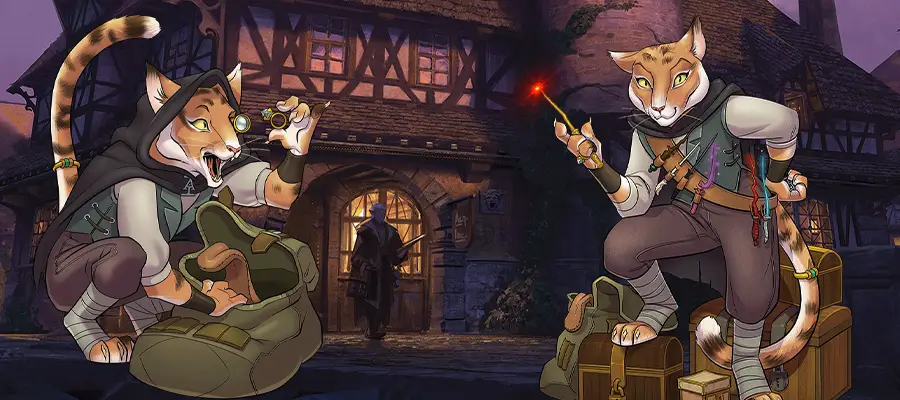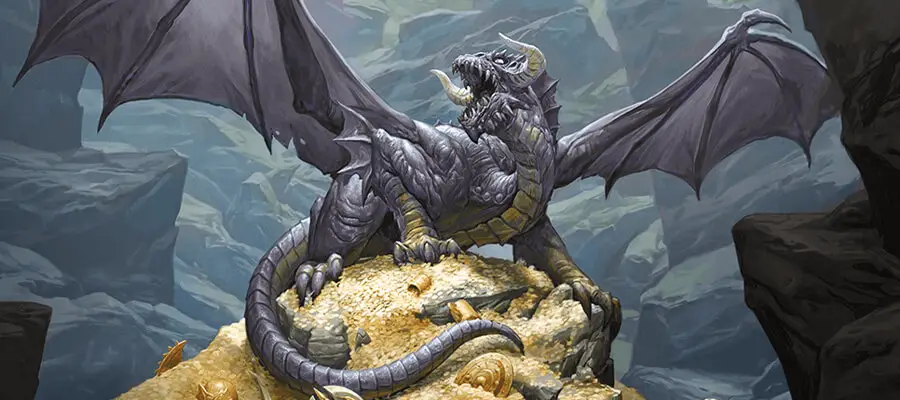How to become a better D&D player featured image is credited to Wizards of the Coast’s D&D 5e Storm King’s Thunder adventure book.
Disclaimer: This article contains affiliate links that add gold to our coffers.
D&D is a game with a simple win condition: Make sure everyone at the table has fun.
Achieving this goal, though, can be tough. From miscommunications to spotlight-hogging, slow play, and more, the road to fun in D&D can be littered with obstacles.
Many players may think that the DM’s skill alone determines whether a campaign is “good” or bad”—but nothing could be further from the truth. When it comes to the gameplay experience, the DM is merely a figurehead. As a player, the true power to create a fun, engaging, and memorable story lies with you.
So how can you become a better D&D player—the kind of player that DMs love to run for and other players love to play with? Here’s how:
- Shine the Spotlight
- Keep the DM Informed
- Come Prepared
- Take Notes
- Bite Hooks
- Invest in the World
- Plan With Other Players
- Be Willing to Compromise
- Play Your Passion
1. Shine the Spotlight
Dungeons & Dragons is a collaborative storytelling game—there is, quite literally, no “I” in D&D. Yet it can be easy for players to fall into “main-character syndrome,” whether through selfishly hogging the stage or merely failing to notice whether other players are having fun. It’s understandable: when we play other games, we rarely spend much time considering the other players’ experience, instead focusing on our own goals, strategies, or achievements.
But D&D is different. In a TTRPG, having fun is a true positive-sum game. The more fun someone else is having, the more fun everyone at the table is having.
How do you help someone else have fun? You “shine the spotlight” on them—instead of yourself.
For example, you might notice and point out an opportunity for another player to show off their skills, share their backstory, or achieve a major objective. Imagine a rogue and a ranger tracking a pack of gnolls through the woods. The rogue could ask to make a Survival check to track the horde himself—or he could ask the ranger to lend her expertise and offer to lend her a hand.
When we shine the spotlight on others, we create moments for those characters to shine. In the process, however, we achieve something much greater: We strengthen the bond between our characters and others’, improve the party’s ability to achieve its goals, and deepen our collaborative storytelling.
Invite other characters to share their thoughts, feelings, interests, or expectations. Ask them for specialized knowledge or insights. Celebrate their achievements, and offer sympathy and encouragement for failures. When we play selfishly, we can fight over crowning moments like dogs fighting over scraps—but when we play generously, becoming each other’s advocates and cheerleaders, the well of inspiration will never run dry.
2. Keep the DM Informed
The DM may not be the god of the table, but they do facilitate the nuts-and-bolts of the world and story. As such, it’s important to keep them plugged-in to the table’s social dynamics, your own goals and expectations, and any other information that can help them create an enjoyable and meaningful gameplay experience.
Keep the DM up-to-date on your plans and priorities. That might include the NPCs your character hopes to speak with, your suspicions about the campaign’s central mystery, or even the spells you plan to take at the next level-up. Even when they’re playing fiends, fey, or dragons, DMs are only human, and rely deeply on their players to know what to prepare and how to prepare it.
As sessions pass, assuming your DM is happy to receive it, give constructive feedback freely. Let the DM know which scenes or moments stood out, which scenarios or rulings frustrated you, and what hopes you have for upcoming games. Your DM may not be able to change everything to perfectly suit your preferences, but most DMs are glad to do what they can—and eternally grateful for the feedback.
If you’re attempting an eccentric or complex action in-game, make sure to tell the DM what your actions are intended to accomplish. Miscommunications happen! You might have misunderstood the layout of a castle keep, or the DM might have misheard exactly what you’re doing. Mismatches of expectations can also prove frustrating, especially if a DM is confused by a player’s seemingly “futile” or “random” actions. If you let your DM know out-of-character what your character is trying to achieve, it’ll be much easier to build a scene that leaves everybody feeling happy.
Finally—check in with your DM! DMing can be a stressful, lonely job sometimes, and it helps when players show appreciation or take a genuine interest in the DM’s well-being. When the DM is happy, the table is happy.
3. Come Prepared
Whether it’s well-organized dice, an up-to-date character sheet, or an understanding of the rules and features that govern your character’s abilities, nothing helps a game go by more quickly than a player who came prepared.
Before a session, make sure your character sheet is cleaned-up, easy to read, and (if applicable) properly leveled up. If your character has any complex spells or abilities, make sure to read those features carefully before coming to a session. If there’s any ambiguity or confusion about how they work, use resources like the Player’s Handbook, Reddit, or Sage Advice to confirm how the pieces fit together.
At the start of a session and throughout the game, keep your “play area” neat and organized. Organize your dice by denomination to make sure you never have to spend more than a half-second searching for a d8, and keep your rolls within a dice tray to make sure those dice never go missing.
With proper preparation, not only will your own game experience be improved, but you’ll also have more freedom and flexibility to help other players keep things moving—whether by lending a die, clarifying a ruling, or otherwise.
4. Take Notes
Let’s be fair: Playing a game of Dungeons & Dragons shouldn’t feel like homework. At the same time, your ability to engage with and truly appreciate the game will be vastly improved with proper note-taking.
As we watch television shows or read books, we learn to recognize and develop relationships with the characters on-screen (or on-page). We begin to understand and remember their nuances, their eccentricities, and their interests. We key into key themes, concepts, or locations. Imagine how different Harry Potter and the Philosopher’s Stone would have been if the main characters hadn’t remembered that the third-floor corridor was off-limits, or Star Wars: The Empire Strikes Back if Luke hadn’t remembered what Ben Kenobi said about his father!
By occasionally jotting down key information as you play the game—including NPC names and personality traits, details about locations or historical events, and quest information—you enrich your ability to enjoy the game on a deeper level. Without proper note-taking, playing a game of D&D is like watching a generic summer blockbuster—entertaining in the moment, but without much depth or a lasting impression. With notes, however, you can improve the play experience for yourself, your DM, and the other players around the table.
5. Bite Hooks
On more than one occasion, I’ve heard DMs fret over fears that players might stray from the campaign’s path. “What if they don’t bite the story hook I made?” they say nervously. “What if, instead of hunting the werewolf in the mysterious woods, the players decide to swing by the tavern, pick a fight with the town guard, or skip town altogether?”
Almost inevitably, when players fail to bite the hooks that a DM has prepared, the game as a whole suffers. The DM feels stressed. The players feel frustrated. Isn’t D&D, after all, a game all about agency—about doing what you want, rather than what the game wants?
That may be so! But it’s important to recognize that Dungeon Masters are neither fortune-tellers nor mind readers, and most DMs are better writers than improvisers. When a player sits down to play a game of D&D, a social contract is formed: the Dungeon Master implicitly promises to create a game that the player will find enjoyable, and the player implicitly agrees to play that game, rather than a game of the player’s own devising.
As such, when a new story hook pops up in the campaign, players should feel comfortable trusting their DMs—trusting that these are real adventures, and not traps; that the DM has put real time and effort into preparing them; and that the DM has done their best to tune them to the players’ interests—and then bite the hook.
That isn’t to say that players should refrain from developing creative solutions to the DM’s hooks, or even giving critical feedback outside of the game if there’s something they’re not enjoying. But in almost all cases, DMs work hard to create fun games that will help their players express their interests and creativity. When players take the hand that’s offered instead of running off, everyone—including the players—wins.
6. Invest in the World
Players, almost inevitably, invest the bulk of their time, effort, and passion in their characters—and for good reason! A PC is the player’s “window” into the world of the game—the avatar through which they experience the story and gameplay of the campaign.
For this reason, however, it’s not uncommon for players to feel detached from the world the campaign takes place in. Sometimes, it’s a DM who feels frustrated with a player bringing the same character to every game. Sometimes, it’s a player who feels bored with the DM’s encyclopedias of uninteresting homebrew lore. Whatever the case,, many D&D campaigns face a chronic disconnect between the world of the game and the played experience of the players around the table.
By tying the two closer together, however, players can give the DM additional ammunition to create interesting hooks, relationships, and stories for their characters, even as they create stronger motivations for their character to act within the world of the game.
This doesn’t mean that players should have to memorize a lengthy tome of homebrew history—far from it. Dungeon Masters should still work to ensure that their world remains both accessible and interesting to their players. But players can create things too. Work with your DM to find or create locations, characters, or historical events within the world that your character might be tied to. Collaborate to build real, meaningful relationships that may appear in the campaign. By grounding your character in the world of the game, you can enrich your own gameplay experience by creating a universe for your character to act in, rather than a mere façade.
7. Plan With Other Players
Remember the point about playing generously? Strategizing generously is also important—both on and off the battlefield. It might feel like your barbarian’s battleaxe, climber’s kit, and Athletics proficiency are the only options she has, but in truth, you also have access to a host of other options: the wizard’s gust of wind, the rogue’s grappling hook, and the druid’s wild shape.
A feature’s presence on another player’s character sheet does not make it any less viable as an option. If you’re taking notes, jot down each feature or spell your fellow PCs show off in combat, building a toolbox for later reference and use. Don’t expect to boss other players around on how best to play their own character—but don’t expect to play in a vacuum, either. D&D is a social, collaborative game, which makes it important for the players to find opportunities to collaborate wherever possible.
If you find yourself arguing with other players about the path the party should take, ask the other characters what features, knowledge, or insight they have that could help make the decision easier. If you find yourself fighting solo in a ten-person melee, work with another player (either publicly on your turn, or quietly outside of your turn) to plan a cooperative approach. Even something as simple as a basic “good cop/bad cop” strategy can work wonders in an antagonistic social encounter. You might be surprised at what you can accomplish together that you couldn’t do alone.
8. Be Willing to Compromise
Unlike single-player games or other solo endeavors, D&D and other table-top roleplaying games are unique in their status as collaborative games. You can’t play D&D alone—and just like any social endeavor, if you’re not willing to compromise with those you’re playing with, you’re not going to get very far.
What does this mean in practice? It means graciously conceding arguments when you’re outvoted, rather than working tirelessly to sway others to your line of thinking. It means respecting others’ priorities and occasionally sacrificing your own priorities to help others achieve theirs. It means being willing to do what others ask of you, even if you didn’t come up with the original plan. And it means making tradeoffs in the type of game you’re playing—both with other players and with your DM.
That’s not to say that you should be a doormat! You have a right to your own boundaries, your own preferences, and your own enjoyment. At the same time, it’s important to recognize that, when five people sit down to play a game of D&D, no two of those players will get what they want all of the time. You can either die on every hill—or you can learn to make sacrifices graciously for the good of the group.
9. Play Your Passion
At the end of the day, Dungeons & Dragons is a game—and games are about having fun. To be the best player you can be, it’s important to make sure that your efforts and decisions are all about making sure that you are having a good time at the table, rather than out of a grim sense of obligation to those you’re playing with.
Don’t feel forced to play a healer if your party doesn’t have one. Don’t feel forced to be “the responsible one” if your party is going off the rails. Don’t feel forced to play a slapstick comedy campaign if what you really wanted was a serious, high-fantasy epic.
You have a right to your own enjoyment. If you find an insurmountable obstacle—a true pit of quicksand that’s sucking all of the fun out of the game—it’s important to know that you have the right to bow out. As the saying goes, it’s better not to play D&D at all than to stay stuck in a game of bad D&D. But if you’re communicating openly and honestly with your DM and the other players at the table, few obstacles to a good campaign are truly insurmountable.
So don’t waste time making suboptimal decisions or sticking by unenjoyable experiences. Life’s too short for that. Instead, find what experiences fuel your passion for the game—those things that made you fall in love with this hobby in the first place—and seize them with both hands.
About the Author: DragnaCarta is a guest writer for FlutesLoot.com and a veteran DM with 12+ years of experience. He is the author of the popular “Curse of Strahd: Reloaded” campaign guide, a moderator of /r/CurseOfStrahd, and the Dungeon Master and director for the Curse of Strahd livestream “Twice Bitten.” You can get his D&D hot takes and commentary by following his Twitter, or get personal RPG mentoring plus early access to projects by joining his Patreon.
Cast Message in the comments section below to ask DragnaCarta about this topic. You can find other articles by DragnaCarta on FlutesLoot.com.
Note from Flutes – you might enjoy this DM Round Table discussion about what makes a “skilled player” in D&D:




As a DM, I wholeheartedly support this!
Added to the Blog Database.